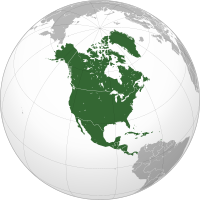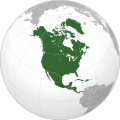The North America Portal

North America is a continent in the Northern and Western Hemispheres. North America is bordered to the north by the Arctic Ocean, to the east by the Atlantic Ocean, to the southeast by South America and the Caribbean Sea, and to the west and south by the Pacific Ocean. The region includes the Bahamas, Bermuda, Canada, the Caribbean, Central America, Clipperton Island, Greenland, Mexico, Saint Pierre and Miquelon, Turks and Caicos Islands, and the United States.
North America covers an area of about 24,709,000 square kilometers (9,540,000 square miles), representing approximately 16.5% of the Earth's land area and 4.8% of its total surface area. It is the third-largest continent by size after Asia and Africa, and the fourth-largest continent by population after Asia, Africa, and Europe. As of 2021[update], North America's population was estimated as over 592 million people in 23 independent states, or about 7.5% of the world's population. In human geography, the terms "North America" and "North American" can refer to Canada, the United States, Mexico, and Greenland or, alternatively, Canada, Greenland and the US (Mexico being classified as part of Latin America) or simply Canada and the US (Greenland being classified as either Arctic or European (due to its political status as a part of Denmark) and Mexico classified as Latin American).
It is unknown with certainty how and when first human populations first reached North America. People were known to live in the Americas at least 20,000 years ago, but various evidence points to possibly earlier dates. The Paleo-Indian period in North America followed the Last Glacial Period, and lasted until about 10,000 years ago when the Archaic period began. The classic stage followed the Archaic period, and lasted from approximately the 6th to 13th centuries. Beginning in 1000 AD, the Norse were the first Europeans to begin exploring and ultimately colonizing areas of North America.
In 1492, the exploratory voyages of Christopher Columbus led to a transatlantic exchange, including migrations of European settlers during the Age of Discovery and the early modern period. Present-day cultural and ethnic patterns reflect interactions between European colonists, indigenous peoples, enslaved Africans, immigrants from Europe, Asia, and descendants of these respective groups. (Full article...)
Boston is the capital and most populous city in the Commonwealth of Massachusetts in the United States. The city serves as the cultural and financial center of the New England region of the Northeastern United States. It has an area of 48.4 sq mi (125 km2) and a population of 675,647 as of the 2020 census, making it the third-largest city in the Northeast after New York City and Philadelphia. The larger Greater Boston metropolitan statistical area, which includes and surrounds the city, has a population of 4,919,179 as of 2023, making it the largest in New England and eleventh-largest in the country.
Boston was founded on the Shawmut Peninsula in 1630 by Puritan settlers. The city was named after Boston, Lincolnshire, England. During the American Revolution, Boston was home to several events that proved central to the revolution and subsequent Revolutionary War, including the Boston Massacre (1770), the Boston Tea Party (1773), Paul Revere's Midnight Ride (1775), the Battle of Bunker Hill (1775), and the Siege of Boston (1775–1776). Following American independence from Great Britain, the city continued to play an important role as a port, manufacturing hub, and center for education and culture. The city also expanded significantly beyond the original peninsula by filling in land and annexing neighboring towns. Boston's many firsts include the United States' first public park (Boston Common, 1634), the first public school (Boston Latin School, 1635), and the first subway system (Tremont Street subway, 1897). (Full article...)

Earl William "Madman" Muntz (January 3, 1914 – June 21, 1987) was an American businessman and engineer who sold and promoted cars and consumer electronics in the United States from the 1930s until his death in 1987. He was a pioneer in television commercials with his oddball "Madman" persona; an alter ego who generated publicity with his unusual costumes, stunts, and outrageous claims. Muntz also pioneered car stereos by creating the Muntz Stereo-Pak, better known as the 4-track cartridge, a predecessor to the 8-track cartridge developed by Lear Industries.
He invented the practice that came to be known as Muntzing, which involved simplifying otherwise complicated electronic devices. Muntz produced and marketed the first black-and-white television receivers to sell for less than $100, and created one of the earliest functional widescreen projection TVs. He was credited with coining the abbreviation "TV" for television, although the term had earlier been in use in call letters for stations such as WCBS-TV. A high school dropout, Muntz made fortunes by selling automobiles, TV receivers, and car stereos and tapes. A 1968 Los Angeles Times article noted that in one year he sold $72 million worth of cars; five years later he sold $55 million worth of TV receivers, and in 1967 he sold $30 million worth of car stereos and tapes. (Full article...)

The Spanish conquest of Honduras was a 16th-century conflict during the Spanish colonization of the Americas in which the territory that now comprises the Republic of Honduras, one of the seven states of Central America, was incorporated into the Spanish Empire. In 1502, the territory was claimed for the king of Spain by Christopher Columbus on his fourth and final trip to the New World. The territory that now comprises Honduras was inhabited by a mix of indigenous peoples straddling a transitional cultural zone between Mesoamerica to the northwest, and the Intermediate Area to the southeast. Indigenous groups included Maya, Lenca, Pech, Miskitu, Mayangna (Sumu), Jicaque, Pipil and Chorotega. Two indigenous leaders are particularly notable for their resistance against the Spanish; the Maya leader Sicumba, and the Lenca ruler referred to as Lempira (a title meaning "Lord of the Mountain").
In March 1524, Gil González Dávila became the first Spaniard to arrive in what is now Honduras with the intention of conquest. He founded the first Spanish port upon the Caribbean coast, Puerto de Caballos, which became an important staging post for later expeditions. The early decades of the Spanish conquest of Honduras were beset by jurisdictional disputes between different Spanish colonies attempting to invade the territory, which resulted in conflict between rival expeditions launched from Mexico, Hispaniola, and Panama. The Spanish territory was reorganised as Higueras in the west, and Honduras in the east. As the Spanish became established throughout Central America, the colony of Honduras-Higueras became involved in territorial disputes with neighbouring colonies in Nicaragua, Guatemala and El Salvador. (Full article...)
Did you know...
- ...that the proposed Atlantica trade bloc would economically tie New England in the U.S. to the Atlantic Provinces of Canada?
- ...that a circumferentor (pictured) was an important tool to surveyors for mapping the North American frontier?
- ...that Tropical Storm Larry caused five deaths and US$53.6 million in damage when it struck the Tabasco state of Mexico, the first landfall in the state since 1973?
- ... that the Chontal Maya of Tabasco consider themselves the direct descendants of the Olmec civilization?
- ... that secondary students can take Yup'ik studies in the Yupiit School District, which is located in the Bethel Census Area of Alaska?
Selected panorama

Topics
Categories
List articles
Related portals
Northern America
Central America
Caribbean
WikiProjects
 North America
North America-
 Canada
Canada -
 Greenland
Greenland -
 Mexico
Mexico -
 Saint Pierre and Miquelon
Saint Pierre and Miquelon -
 United States
United States  Central America
Central America-
 Belize
Belize -
 Costa Rica
Costa Rica -
 El Salvador
El Salvador -
 Guatemala
Guatemala -
 Honduras
Honduras -
 Nicaragua
Nicaragua -
 Panama
Panama  Mesoamerica
Mesoamerica Caribbean
Caribbean-
 Antigua and Barbuda
Antigua and Barbuda -
 Bahamas
Bahamas -
 Barbados
Barbados -
 Bermuda
Bermuda -
 Cuba
Cuba -
 Dominica
Dominica -
 Dominican Republic
Dominican Republic -
 Grenada
Grenada -
 Haiti
Haiti -
 Jamaica
Jamaica -
 Puerto Rico
Puerto Rico -
 Saint Kitts and Nevis
Saint Kitts and Nevis -
 Saint Lucia
Saint Lucia -
 Saint Vincent and the Grenadines
Saint Vincent and the Grenadines -
 Trinidad and Tobago
Trinidad and Tobago
Associated Wikimedia
The following Wikimedia Foundation sister projects provide more on this subject:
-
Commons
Free media repository -
Wikibooks
Free textbooks and manuals -
Wikidata
Free knowledge base -
Wikinews
Free-content news -
Wikiquote
Collection of quotations -
Wikisource
Free-content library -
Wikiversity
Free learning tools -
Wikivoyage
Free travel guide -
Wiktionary
Dictionary and thesaurus


























